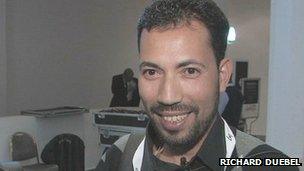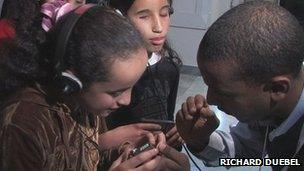Cinema opens up for Morocco's blind
- Published
Aziz Bouallouchen, a Moroccan student who lost much of his sight in 2005, on how audio description has made it possible for him to go to the cinema
As Aziz Bouallouchen walks into the foyer of a plush cinema in the Moroccan city of Marrakesh, he is given not a pair of 3D glasses that one can expect to find in many cinemas around the world but a pair of headphones.
Mr Bouallouchen, in his 20s, is no ordinary cinema-goer and this is no ordinary cinema.

Aziz Bouallouchen, who lost his sight seven years ago, now feels part of the world of cinema
Every seat is equipped with special devices to enhance the enjoyment of blind and partially-sighted film-lovers.
The film being shown is Lalla Hoby, a popular Moroccan comedy about a man who crosses the Straits of Gibraltar in order to look for his wife who has left him for another man and gone to live in Belgium.
Released in 1996, it is the only North African film to have been adapted to carry audio description.
Leading the way
Wearing headphones plugged into small receivers in the seats' arms, Mr Bouallouchen listens to a voice explaining the action sequences, body language, the scenery - the "in-between" moments without which a film's meaning is lost.
"It's a brilliant idea," Mr Bouallouchen says. "I haven't been able to 'see' a film since I suffered a disease that robbed me of my eyes."
"But now I can feel part of the world of cinema," he says.

Special headsets enhance the cinema-going experience of blind and partially-sighted people
Mr Bouallouchen lost his sight in 2005 after a rare disease called Behcet's syndrome attacked his optic nerve.
Seven years on, he is sitting next to sighted people, "watching" a film.
And, thanks to the audio description, everyone laughs at the same time at the antics of the hero of Lalla Hoby as he falls out of a small boat crossing the Straits of Gibraltar.
Morocco is leading the way in Africa with the use of this new technology.
A voice talks "alongside" the film's action and provides a more inclusive cinema experience for visually-impaired people.
"We are the only country in Africa and the Arab world that offers this opportunity to the blind," says Nadia el-Hansali of the Marrakesh International Film Festival Foundation.
The foundation - which hosts the annual influential film festival, where audio-described films have been screened for the past two years - is funding the adaption of the mainstream films for blind people.
Eight films now carry audio description, including L'Atlante (1934), The African Queen (1951) and East of Eden (1955).
Over the next 18 months another six will be adapted.
Ms el-Hansali writes the scripts for artists to voice over alongside the film's actions.
It is very precise, with the audio fitting exactly into the spaces between the actors' dialogue.
"We have worked out how much to say and what is really necessary to understand the film fully," Ms el-Hansali says.
"I avoid giving too much information that would only confuse those who can't see the screen."
Real cinema outing
The aim is to move away from the days of volunteer narrators, standing up in the cinema, doing their best to describe what is happening on the silver screen - but often talking over the crucial dialogue.
Mohamed Doukkali is a white-haired philosophy lecturer at the University of Rabat in Morocco's capital.
He is a fan of technology and already uses a specially-adapted computer in his daily work.
"One of the advantages of new technology is that it removes some of the obstacles in our way," Mr Doukkali says.
He describes himself as a "real cinephile", but says he usually only watches DVDs at home with someone telling him what is going on.
He is thrilled to have finally had a real cinema outing.
"Thanks to a voice that describes what is happening on the screen we are able to grasp films in a way we could not before," he says.
"It is much more enjoyable to watch a movie in the company of a big audience - after all that is what the cinema is all about."